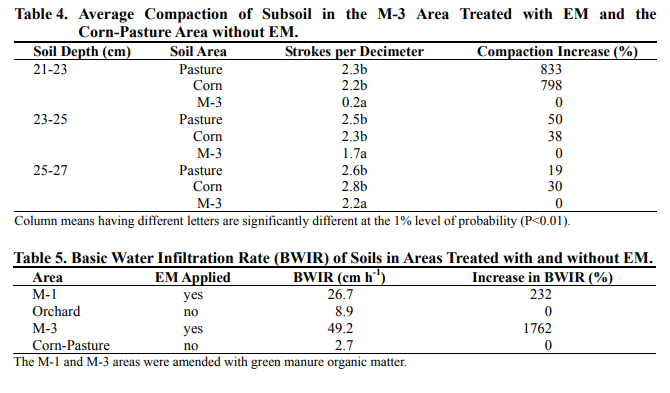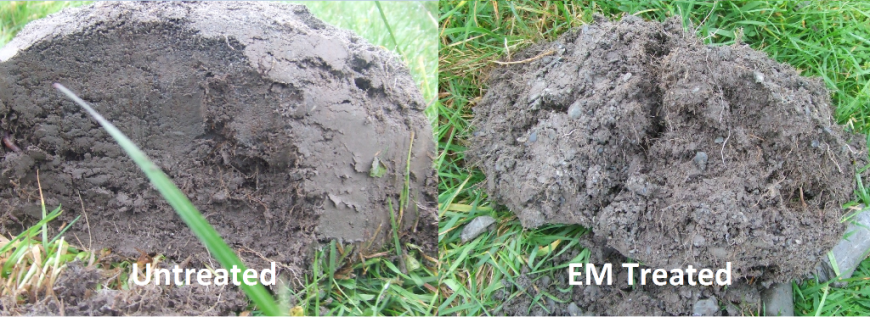The threat of soil compaction is greater today than in the past because of the dramatic increase in factors such as stock density/stocking rate, heavy tillage and poor crop rotations, an increase in the size of farm equipment and the changing climate.
Effects of Soil Compaction on Crop Health
Compaction becomes a major limiting factor in crop production. One of the major effects of soil compaction is an increase in the bulk density of soil. An increase in the bulk density of the soil will start having major effects on root growth. With increasing bulk density, a decrease in soil porosity occurs. Large macropores, which are essential for water and air movement throughout the soil, are reduced by soil compaction. This has a further limiting effect on root growth and function. Subsequently root penetration is limited if roots encounter much resistance. An increase in the density of the soil makes it much harder for roots to penetrate and thrive.
Soil structure will fall apart under soil compaction this will in turn have a dramatic impact on the oxygen content of the soil and also the water infiltration rate. Typically this results in crops becoming more easily damaged by drought because of a restricted root system and the lack of water holding capacity in the soil.
What is the effect of compacted soils on Soil Life?
The soil food web is the biological make-up of the soil. An incredible diversity of organisms makes up the soil food web, which range in size from tiny bacteria, algae, fungi, and protozoa, to the more complex nematodes and micro-arthropods, to the visible earthworms and insects. In compacted soils the larger organisms cannot survive – they cannot move through it in search of food because the tunnels and burrows that make up the highways within the soil have been destroyed. Another effect is that oxygen cannot freely move around in the soil, which can create an anaerobic environment. After a period of time under these anaerobic conditions, the only soil food web organisms left are the bacteria and opportunistic fungi and protozoa, which are so small in size they are able to move through even a compacted soil.
Anaerobic bacteria thrive in compacted soils as oxygen levels are severely reduced. Negative anaerobic microbe’s produce metabolites that can kill plant roots. Plant roots also have trouble moving compacted soils and since they can no longer rely on their interactions with symbiotic microbes in the soil to bring back nutrients and waters they are highly stressed. The food web now changes from a balanced healthy system, to one with limited beneficial microorganisms and dominated by harmful elements and negative microbes. This situation can be very difficult to reverse and can severely reduce the future productivity of that soil.
How EM Can Help Soil Compaction
Applying EM and food sources, help to return the organisms that are needed to build and maintain soil structures and a healthy soil food web. EM will work to correct the cause of compaction by opening up the soil and allowing oxygen to return, some of the microbes in EM are facultative which allow them to survive in anaerobic conditions. EM will also support the growth of other beneficial organisms like mychorrizae, worms, and insects, bringing nature back into balance. The microbial action of EM will produce lots of polysaccharides - glues that hold the soil together and hold in moisture, improving drought resistance. In addition EM will help increase aggregate stability; improved stability, reduces soil erosion and run-off.
Trial on the Effect of EM on Soil Productivity
A study was conducted to determine how EM interacts with soil physical, chemical and microbiological properties. This trial conducted by the College of Agriculture of Sao Paulo in Brazil found that applications of EM and green manure increased crop productivity while soil erosion and the incidence of plant disease declined. A farm with compacted soil, severe soil erosion and low crop productivity solved these problems by using EM for 2 to 3 years. Soils with and without EM were compared for
- Compaction
- Basic water infiltration rate
- Soil porosity
Table 4 and 5 demonstrate that the EM treated areas (M-3) were able to prevent soil compaction and significantly increase the water infiltration rate. The full paper also reported that the financial returns on the EM treated areas were more profitable. Follow this link to the full paper.

Farmer Comparison
A recent farmer led comparison trial on the West Coast, showed EM’s ability to reduce soil compaction. The below image shows the comparison of the EM treated and untreated areas of the paddock, clearly showing that EM has reduced the soil compaction issue.

Source link














